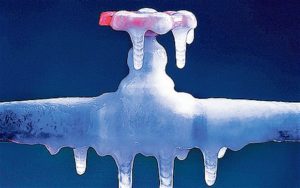Watch out for frozen pipes in Charlottesville Homes
 As cold weather approaches if you own a home in the Charlottesville area you probably already know that when temperatures dip into the 20’s for more than a few days the possibility of frozen pipes becomes a reality. New homeowners may have heard that winterization is important, but in the hubbub of your first year living in a home you own (finally!), it can be easy to overlook the need to prepare for the cold weather ahead. After all, it’s just not something renters deal with; prepping pipes for winter is often the landlord’s job.
As cold weather approaches if you own a home in the Charlottesville area you probably already know that when temperatures dip into the 20’s for more than a few days the possibility of frozen pipes becomes a reality. New homeowners may have heard that winterization is important, but in the hubbub of your first year living in a home you own (finally!), it can be easy to overlook the need to prepare for the cold weather ahead. After all, it’s just not something renters deal with; prepping pipes for winter is often the landlord’s job.
Ideally, you should winterize your pipes in the fall, before winter seriously sets in. But if you’ve forgotten and all of a sudden you’re in the middle of a deep freeze, there’s still time to prevent disaster.
Here are some easy techniques to save your pipes from bursting:
1. Turn On Your Faucets
When the temperatures in Charlottesville drop into freezing and stay there, turning on your faucets — both indoors and out — can keep water moving through your system and slow down the freezing process. There’s no need to waste gallons of water: Aim for about five drips per minute2. Open Cabinet Doors
During cold weather, open any cabinet doors covering plumbing in the kitchen and bathroom, especially if the cabinet is against an outside wall. This allows the home’s warm air to better circulate, which can help prevent the exposed piping from freezing. While this won’t help much with pipes hidden in walls, ceilings, or under the home, it can keep water moving and limit the dangerous effects of freezing weather.
3. Wrap Your Pipes
If your pipes are already on their merry way towards freezing, wrapping them with warm towels might do the trick. You can cover them with the towels first and then pour boiling water on top, or use already-wet towels — if your hands can stand the heat (use gloves for this). This should help loosen the ice inside and get your system running again.
4. Pull Out Your Hairdryer
A hairdryer (or heat gun) can be a godsend when your pipes are freezing. If hot rags aren’t doing the trick, try blowing hot air directly on the pipes. Important note: You don’t want to use a blow torch or anything that produces direct flames, which can damage your pipes and turn a frozen pipe into an even worse disaster. You’re trying to melt the ice — not your pipes.
5. Frozen Pipes? Shut Off The Water
Have your pipes already frozen? Turn off the water immediately. (Hopefully you know where the master shut-off is, but if not, now’s the time to find it!) Make sure to close off any external water sources, like garden hose hookups. This will prevent more water from filling the system, adding more ice to the pile, and eventually bursting your pipes — the worst-case scenario. This also will help when the water thaws; the last thing you want after finally fixing your frozen pipes is for water to flood the system — and thus, your home.
6. Disconnect your outside hose bibs.
Those can cause the faucet to burst and you won’t realize it till next spring when you go to turn on the hose to water your newly plant flowers.
We live in a neighborhood where we have apartments above our detached garages. They are called Carriage homes. But, they are notorious for having the pipes freeze. The pipes come up through the unheated garages into the apartments and every winter someone has their pipes freeze in their Carriage house. Ours comes up through a chase in the garage that does have a trap door. Whenever the temperatures are in the 20’s for several days at a time we have a small space heater that we run at night to keep those pipes warm. During the day the sunlight warms things up and the heater is not needed. I hear people think because they are home and their home is heated their pipes won’t freeze. But, it happens all the time. So take care and be prepared. It’s supposed to get really cold by next weekend.

